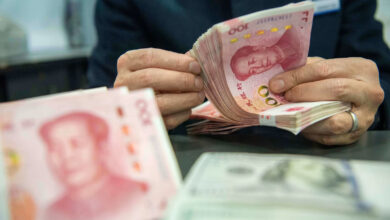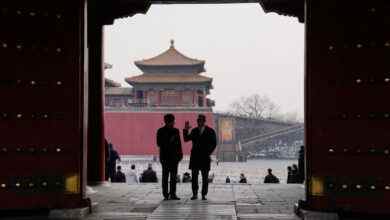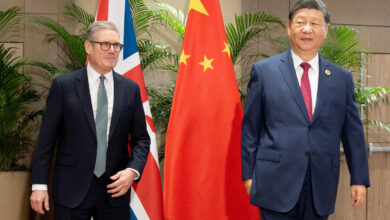It’s been instructive to watch how China has reacted to the Nobel Committee’s decision to award Chinese dissident Liu Xiaobo with its Peace Prize. Xiaobo is an academic, a public intellectual and an activist who backed a 2008 call for reforms in the way China is ruled. Currently in prison, he has been denigrated in the state press and prevented from making a public statement. His wife is now under house arrest. The Chinese government has vociferously condemned the Nobel Committee and castigated Norway and other Western countries for “attacking” it through the Peace Prize.
The case of China is interesting from an Arab perspective. Many of the countries in our part of the world, especially the ones on good terms with the United States and European Union, have not been able to afford such confrontational stances on human rights for a while. The fall of the Soviet Union and the growing irrelevance of the Middle East peace process have decreased the strategic capital of Egypt, Morocco, Jordan and others, forcing these countries to make some political adjustments over the past two decades. These have ranged from a few definitive improvements to, on most occasions, what has amounted to little more than window-dressing. Rhetorical commitments are made to democratization, most excesses are avoided and a middle way is found so that everyone can keep up appearances. Aid continues to flow, trade deals are inked, diplomatic initiatives converge, and the system keeps on.
The Chinese approach is based on several factors. One is its fairly unique political system, evolved from a once-extreme totalitarian mindset. China can boast of a relatively cohesive ideology that puts the state–not just a single clique or ruling family–at the center of its actions and its conception of what its role in the world should be. Another factor is a (partly historically justified) paranoia about the West. But, first and foremost, China can afford to brush off criticism and defend a vision of global affairs in which national sovereignty trumps international treaties and sentiments because it is, at least in economic terms, a country of paramount global importance.
Which is the better situation, that of China or that of the Arab states? The answer is complicated. China’s best friend in the Arab world, Sudan, has a pretty poor record that would be poorer if it wasn’t a quasi-failed state. Libya and Tunisia are probably, in their own ways, as extreme as China when it comes to controlling dissidents. Syria is not far off, and Iraq is too chaotic to make heads or tails of its approach. The small Gulf states are not really comparable in any meaningful way.
That leaves the countries that Americans have taken to calling the “moderate” Arab states. Over the past decade these states have been pressed to show democratic progress, hold cleaner elections, allow greater press freedom, and show lenience towards political activists. Many have done so, and it does not appear to have mattered that much. These regimes retain a monopoly on state power, continue to evade accountability and are above all able to prevent credible alternatives from emerging. Authoritarianism in these countries has not retreated, it has been redeployed and adapted to a new global environment.
This redeployment has meant small concessions. Human rights discourse, which China either doesn’t bother with or flatly opposes, has been partly recuperated through official bodies in Arab states, though dissenters continue to exist. There is limited freedom of the press, but it is precarious: Publications must contend with relentless pressure, advertising boycotts, punishing libel fines, and governments that treat public information as state secrets and impose arbitrary restrictions on reporting. Human rights organizations can operate, but a barrage of obstacles makes it more difficult for them to access to victims, information or merely obtain licenses to establish themselves legally and receive funding. Political parties are allowed, but are severely limited and must constantly carry out behind-the-scenes negotiations with the security services.
In most Arab countries, a state of ambiguity exists between what the regimes profess to be–secular, populist, democratizing if not democratic, law-abiding–and how they really are. There is no such ambiguity in China, where there are no opposition political parties, newspapers are state-owned and membership in civil society groups earns you Xiaobo’s fate. In this respect, perhaps Arabs should count themselves lucky. They don’t have democracy, but they often have breathing room, a system that can be flexible in its repression.
On the other hand, one wonders whether China’s evolution might continue towards the positions Xiaobo espouses, much as it shed its attachment to Mao Zedong’s totalitarianism in the late 1970s and has moved away from total state control of the economy since the 1990s. There have been paradigm shifts in the thinking of the Chinese regime before, and it’s hard to believe that this multicultural country of 1.32 billion will not adapt in its own way to demands for better governance.
One major difference between China and Arab countries–productivity levels aside–is that China’s leadership has a national vision beyond perpetuating itself. Hopefully that vision can one day grow to accommodate the likes of Xiaobo, whose struggle is one for basic human dignity. In the meantime, we can in some ways be grateful for the blurred, comparatively easy-going approach of some Arab states. They oscillate depending on foreign pressures and domestic unrest, constantly taking the temperature and allowing for release, co-optation and dissuasion. This may be better than the situation in China today, but a nagging question remains: In 20 years, will the Arabs have stayed in the same nebulous place while the Chinese make another leap forward?
Issandr El Amrani is a writer on Middle Eastern affairs. He blogs at www.arabist.net. His column appears every Tuesday.




